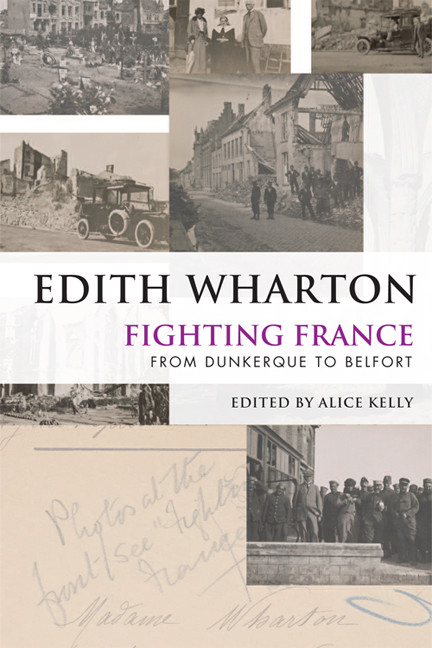Introduction: Wharton in Wartime
Published online by Cambridge University Press: 05 September 2016
Summary
At the outbreak of the Great War in August 1914, the American novelist Edith Wharton was living in France. She quickly became a highly active participant in relief efforts and an advocate for American intervention in the war in her fiction and non-fiction. Wharton's explicit war writings consist of a series of non-fiction impressions published as articles in Scribner's Magazine and The Saturday Evening Post, and collected as Fighting France in 1915; three short stories ‘Coming Home’ (1915), ‘Writing a War Story’ (1919), and ‘The Refugees’ (1919); the 1916 fundraising anthology The Book of the Homeless; and the novels The Marne (1918) and A Son at the Front (1923), as well as a number of poems, newspaper articles and talks. In the Wharton Collection at Yale, there is also an unfinished and previously unknown story from this period entitled ‘The Field of Honour’. This body of work demonstrates that Wharton did not remain ‘pen-tied’ as she had been at the beginning of the war, but that she engaged with the war in a variety of genres and despite her extensive war work, she produced a considerable amount of writing.
Wharton's war writing has frequently been discussed – and largely dismissed – as propaganda. Stanley Cooperman considered Wharton to have ‘combined gentility with bloodthirst, the manners of the social novelist with the matter of the recruiting poster’, and even Wharton's most steadfast advocates have been quick to dismiss her wartime writing. For such a major twentieth-century literary figure, this neglect is particularly surprising. Shari Benstock attributes it to ‘the larger problems of categorizing women's contributions to war literature’. Re-evaluations of Wharton's wartime writing have been prompted by the broader scholarly interest taken in women's literary contributions to the First World War in recent years, which has uncovered the wartime writings of both unknown and more established female writers. Two book-length studies have focused exclusively on Wharton and the war. Alan Price's largely biographical study The End of the Age of Innocence: Edith Wharton and the First World War offers a history of Wharton's relief activities, with a final chapter considering her post-war fiction.
- Type
- Chapter
- Information
- Fighting FranceFrom Dunkerque to Belfort, pp. 1 - 74Publisher: Edinburgh University PressPrint publication year: 2015

